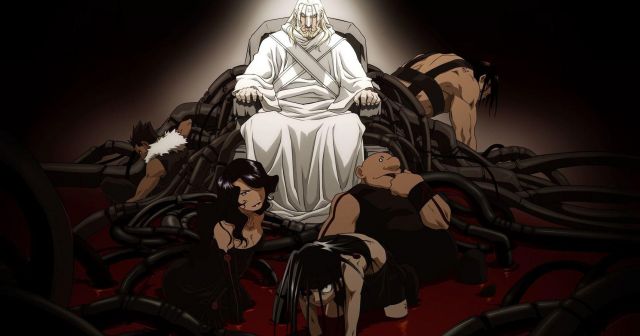Fullmetal Alchemist: Brotherhood remains a timeless masterpiece and one of the most beloved anime series for numerous compelling reasons. It stands apart from typical shonen anime by presenting a deeply nuanced exploration of ethics, human nature, and justice. Unlike the simplistic dichotomy of good versus evil, Fullmetal Alchemist delves into complex moral dilemmas, blurring the lines between right and wrong. This is exemplified by the fact that even characters considered “good” have a dark history, and their path to redemption is far from a conventional redemption arc.
While the series centers around the main protagonists, Ed and Al, who possess a familiar sense of morality, it introduces characters who possess a radically different and almost inhuman perspective on what is right and wrong. Notably, characters like Solf J. Kimblee and the homunculi exhibit priorities that diverge so significantly from human moral standards that it becomes challenging to pass judgment on them solely within the framework of good versus evil. Fullmetal Alchemist: Brotherhood challenges viewers to question their own beliefs and confront the complexities of morality in a thought-provoking manner.
What Is Blue-and-Orange Morality?

Fortunately, there exists a term to describe a moral and ethical framework that exists completely independent of the conventional human model: blue-and-orange morality. While the absolute nature of good and evil or right and wrong may be a subject of debate, it is evident that the blue-and-orange model operates on an entirely different level. According to TVtropes, a character who adheres to blue-and-orange morality possesses a fundamentally distinct mindset from those who perceive the world in black and white. The blue-and-orange paradigm exists along a separate axis, where the concepts of good and evil are nonexistent. Instead, morality is determined by the clash between two opposing sides, devoid of any inherent rightness or wrongness. Blue and orange are not inherently right or wrong; they are simply different.
When viewed from the perspective of good versus evil, a blue-and-orange mentality can range from righteous to completely immoral or evil. However, a being that operates on a blue-versus-orange mentality rejects the traditional scale of morality entirely. Such beings are considered amoral, existing beyond the confines of the conventional black-and-white moral spectrum. They dismiss any notion that certain actions or ideas are intrinsically good or bad. Despite perceiving the same physical reality, two parties may arrive at different conclusions. An action that some may deem highly unethical, unjust, or immoral may be regarded as a shade of orange by others, resulting in opposition from a blue standpoint. However, within this framework, neither blue nor orange can be classified as inherently good or evil, even if they find themselves engaged in bitter conflict.
It is relatively uncommon for shonen or shojo manga/anime series to explore this concept. Therefore, when a series like Fullmetal Alchemist incorporates blue-and-orange morality, it captures the attention and fascination of fans.
How FMA’s Homunculi Don’t Abide by Human Moral Standards

The homunculi in Fullmetal Alchemist: Brotherhood don’t consider themselves good or evil, and they don’t take it seriously when anyone else judges them as evil or villainous. One major reason for this is that the homunculi aren’t a part of mainstream human society, and thus have no reason to subscribe to society’s black-and-white, moral vs immoral system. Amestrian laws, social norms, and taboos are all a result of the black-and-white, human understanding of morality, such as harshly outlawing murder or praising people for being charitable and supporting their community. Human morality generally says “Help other people, and don’t hurt them,” where help = good and harm = evil. This system doesn’t prevent evil such as murder, robbery, and the government’s Philosopher’s Stone project from happening, but at least Amestris’s human society has an agreed-upon frame of reference for right and wrong.
The homunculi reject this system partly because they were never a part of mainstream society. They aren’t human beings — they are homunculi, artificial beings with supernatural powers, so they don’t have to play by humanity’s rules. The homunculi make up their own rules about what they should and shouldn’t do and why, and act accordingly. To them, serving Father is good, and betraying Father is bad. Aside from that, anything goes, and the homunculi won’t feel guilt or shame one another for acts like murder, lying, torture, or manipulation. Their blue-and-orange morality is based on Father’s wishes, not human society’s norms. Functionally, this makes them evil according to the black-and-white, scale since the homunculi break the “don’t hurt people” rule, but the homunculi don’t care or even find it amusing to break that rule. Doing so can even “prove” the homunculi’s superiority to the fragile humans and their fragile rules.
Arguably, the state alchemist Solf J. Kimblee is also an example of someone who follows a blue-and-orange moral code, since he does not care about society’s norms about justice, evil, or morality. Kimblee independently focuses on his own desires and his own judgments, mostly in terms of people being true to themselves. In Kimblee’s mind, personal authenticity is desirable, and contradicting one’s own norms or nature is undesirable. Thus, Kimblee once sided with the homunculi since they’re true to their own nature and feelings, but when Pride broke his own rule and tried to borrow the powers of the supposedly inferior humans, Kimblee objected. In Kimblee’s mind, Pride shifted to the wrong side of orange vs blue, and Kimblee betrayed Pride for that reason alone — not because Pride was evil. This made Kimblee a chaotic and unpredictable being who, when viewed from society’s “good vs evil” perspective, is bewildering, fascinating and — most of all — absolutely terrifying.















Leave a Reply